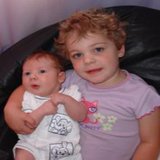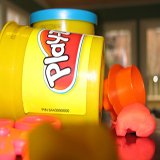Stimulating Child Social Development - 15 Month Old to 18 Month Old
During the child social development phase of 15 - 18 months, my toddler became more assertive.
During this childhood social development stage, your child wants to do more on his own to show his independence. He may become annoyed when you set limits on his behavior.
Don't worry - this is normal for the 15 month old development through to the 18 month old development stage.
Toddler tantrums become a frequent occurrence when they can't get their own way. He is getting more interested in other children, and will play alongside other his own age, although he won't actually interact with them.
Child Social Development
15 - 18 month old
Suitable suggestions for Child Social Development
(15 Month Old - 18 Month Old)
The best strategy to break with anti social behavior is to provide opportunities for him to mix with others of his own age.
The fact that he plays alone in social situations doesn't reduce the importance of this contact - he learns a lot from watching other children's behavior and from studying the different ways in which they play with toys.
Social Contact
Social contact is the best way (and most popular) to provide your child with social development skills. This can be done by taking him to a local parent-and-toddler playgroup. Your presence will give him enough confidence to attend without tears.
Going regularly makes him familiar to being in larger groups of people - building greater social confidence and self concept. If there isn't a local group near you, invite parents of children the same age to your house so that all the toddlers can play together.
And of course, accept social invitations on your child's behalf. The social contact is great for parents, too, providing opportunities to share experiences and talk through problems.
Personal Independence
His identity builds more firmly now and this shows in a number of ways. For instance, he start to pick the toys he wants to play with himself, instead of waiting to be guided by your choice; he takes more initiative in aspects of personal independence, such as feeding and dressing; and he probably asks for specific foods at mealtimes.
When your toddler expresses his own preferences, he isn't being deliberately awkward - it's just that he is beginning to think for himself.
His drive for personal independence can be difficult for you, especially when he starts to make choices that clash with your own plans, but the social and emotional development of his individual identity is an essential part of the growing process and is something to be encouraged.
Naturally your child can't have everything he wants. Yet you can help him in his drive for self reliance living by giving him the change to make small choices.
Be sure to visit all the child social development pages for different ages.
Read more about the different stages of social development.
Top Tips for Child Social Development
(15 Month Old - 18 Month Old)
- Development of Social Skills
- Praise appropriate social behaviors
- Let him try new challenges
- Deal calmly with jealousy
- Include your toddler at family meals
Suggest that when he is with other children he should move towards them in stead of staying beside you all the time. Tell him to pass a toy to another child when they are together in the same room.
When your child acts positively in a social situation (for instance, when he shares a toy, or smiles at another child) give him a cuddle to show him that you are pleased with his social behaviors. Discourage anti social behavior.
If he insists that he can do something by himself, stand back and let him make the attempt (as long as he is not in danger). He learns a lot about himself and his abilities through direct experience.
You may find that he becomes annoyed when he sees you talk to another child, because he likes to keep you all to himself. Calm his agitation, give him a big hug and reassure him that his special place in your affections is not threatened.
Whenever possible, have your child sit at the family table for meals. Although he may be demanding, he will learn more quickly from example how to behave at the table than if he eats alone.
Top Toys for a 15 Month Old - 18 Month Old
- cuddly toys
- toy musical instruments
- inset boards
- toy telephone with receiver
- books with pictures
Be sure to browse through all the child social development pages that is broken down in different age groups.
Find It!
Can't remember where you read something specific? Just type in your search term in the box below and your specific topic will be returned to you instantly.









